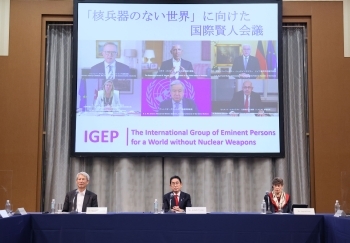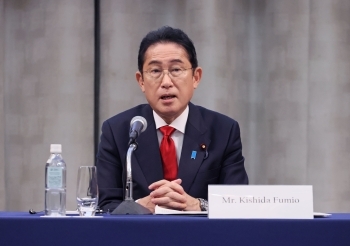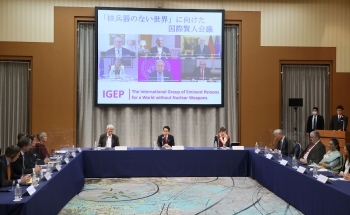Nuclear Disarmament and Non-Proliferation
The First Meeting of the International Group of Eminent Persons
for a World without Nuclear Weapons
December 12, 2022
 The First Meeting of the International Group of Eminent Persons for a World without Nuclear Weapons
(Photo: Cabinet Public Affairs Office)
The First Meeting of the International Group of Eminent Persons for a World without Nuclear Weapons
(Photo: Cabinet Public Affairs Office)
 Prime Minister Kishida making a speech
(Photo: Cabinet Public Affairs Office)
Prime Minister Kishida making a speech
(Photo: Cabinet Public Affairs Office)
 Prime Minister Kishida making a speech
(Photo: Cabinet Public Affairs Office)
Prime Minister Kishida making a speech
(Photo: Cabinet Public Affairs Office)
On December 10 and 11, the first meeting of the International Group of Eminent Persons for a World without Nuclear Weapons (IGEP) was held in Hiroshima. A total of 13 members attended the in-person meeting for frank and candid discussions, including Chair SHIRAISHI Takashi, Chancellor of the Prefectural University of Kumamoto, and two other Japanese members, as well as 10 foreign members including those from both nuclear weapon and non-nuclear-weapon States.
- In the morning of December 10, State Minister for Foreign Affairs TAKEI Shunsuke delivered Prime Minister KISHIDA Fumio's address on his behalf while also delivering the welcoming remarks at the opening session. This was followed by the video messages from six political leaders – (1) former U.S. President Barack Obama, (2) German President Frank-Walter Steinmeier, (3) Australian Prime Minister Anthony Albanese, (4) UN Secretary-General António Guterres, (5) College of Europe Rector Federica Mogherini (former High Representative of the European Union for Foreign Affairs and Security Policy and Vice-President of the European Commission) and (6) former International Atomic Energy Agency (IAEA) Director General Mohamed ElBaradei – and later by that of former Minister for Foreign Affairs of Indonesia Raden Mohammad Marty Muliana Natalegawa who was unable to attend this meeting in person as a member of the IGEP. After the video messages from the six political leaders, each IGEP member who participated in person, delivered their opening remarks, followed by the remarks from Hiroshima Peace Culture Foundation Chairperson KOIZUMI Takashi, who attended the meeting in the capacity of an expert from the host city. Special Advisor to the Prime Minister KISHI Nobuo also expressed his gratitude towards the participants.
- Through the four sessions over the two-day meeting, the IGEP members analyzed the current international situation and security environment surrounding nuclear disarmament, while also having candid discussions regarding challenges in promoting nuclear disarmament, priorities on the nuclear disarmament front and how to advance future discussions in the IGEP.
- In the afternoon of December 11, Prime Minister Kishida attended the closing session after being briefed by the IGEP members on their discussions. In his remarks, Prime Minister Kishida told the session that, as Prime Minister from Hiroshima, he has been making realistic and practical efforts to foster the momentum of the international community for nuclear disarmament amid the increasingly severe situation surrounding nuclear disarmament. He also expressed his expectations that the IGEP will further discuss concrete measures to bring the harsh “reality” closer to the “ideal” and formulate useful outcomes with an eye on the next NPT Review Conference.
- The IGEP members also deepened their understanding of the realities of the atomic bombing through attentively listening to a testimony given by Ms. YAHATA Teruko, who suffered the atomic bombing in Hiroshima at the age of 8. The members also offered flowers to the Cenotaph for the Atomic Bomb Victims and made a visit to the Hiroshima Peace Memorial Museum. In addition, the IGEP members had dialogues with youths including former Youth Communicators for a World without Nuclear Weapons, and discussions with NGOs and other organizations.
- The meeting decided that the IGEP will hold two meetings next year. The next meeting (the second meeting), focusing mainly on discussions among the IGEP members in a hybrid format, is expected to be organized around spring of next year upon taking into account the schedules of the IGEP members.
[Reference 2] International Group of Eminent Persons for a World without Nuclear Weapons (IGEP)
- (1) Background and Objectives
In January 2022, Prime Minister Kishida announced in his Policy Speech to the Diet that the IGEP will serve as an opportunity for participants from nuclear-weapon States and non-nuclear-weapon States, as well as those from countries participating and not participating in the Treaty on the Prohibition of Nuclear Weapons, to exchange ideas and thoughts beyond their respective national positions and engage in candid discussions concerning a concrete path towards the realization of a world without nuclear weapons. - (2) 15 Members of the IGEP
| Shiraishi Takashi (Chair) | Chancellor, Prefectural University of Kumamoto |
| Angela Kane | Former Under-Secretary-General and High Representative for Disarmament Affairs of the United Nations |
| Rose Gottemoeller | Former U.S. Under Secretary of State for Arms Control and International Security Affairs |
| Takamizawa Nobushige | Visiting Professor, Graduate School of Public Policy, the University of Tokyo |
| George Perkovich | Vice President for Studies at the Carnegie Endowment for International Peace |
| Gustavo Zlauvinen | President of the 10th NPT Review Conference |
| Ian Anthony | Programme Director, European Security, Stockholm International Peace Research Institute, SIPRI |
| Bruno Tertrais | Deputy Director, Foundation for Strategic Research (note: participated in the first meeting online) |
| Dina Kawar | Ambassador of the Hashemite Kingdom of Jordan to the United States |
|
Raden Mohammad Marty Muliana Natalegawa | Former Minister for Foreign Affairs of Indonesia (note: participated in the first meeting through a video message) |
| Manpreet Sethi | Distinguished Fellow, Centre for Air Power Studies |
| Akiyama Nobumasa | Dean, School of International and Public Policy, Hitotsubashi University |
| Tanya Ogilvie-White | Research Director, Asia-Pacific Leadership Network for Nuclear Non-proliferation and Disarmament |
| Anton Khlopkov | Director of Center for Energy and Security Studies (CENESS) |
| Tong Zhao | Senior Fellow, Carnegie Endowment for International Peace; Visiting Research Scholar, Princeton University |


